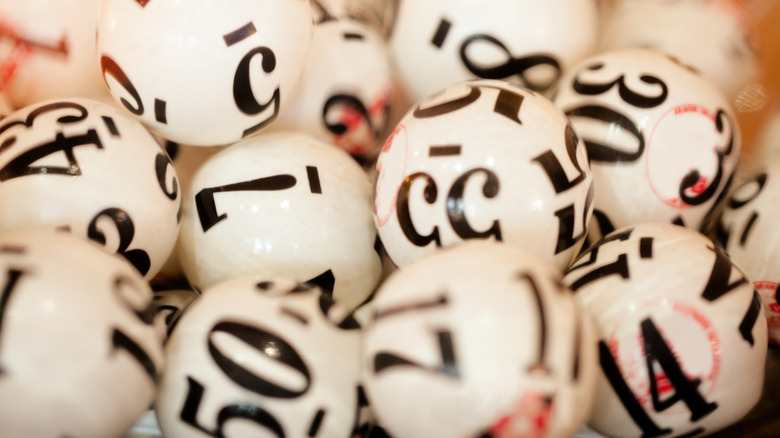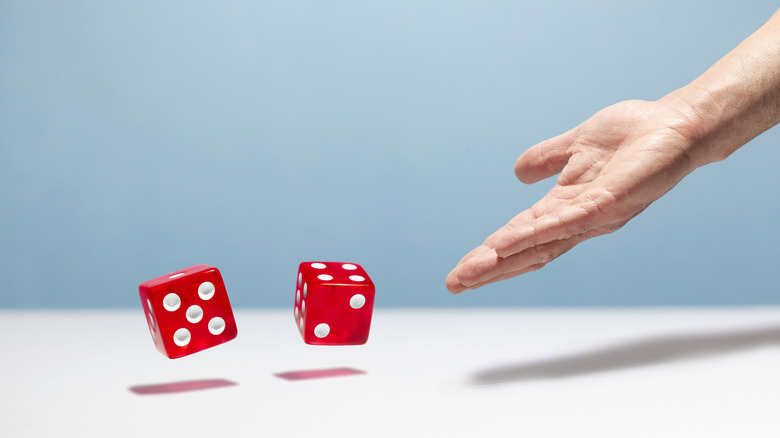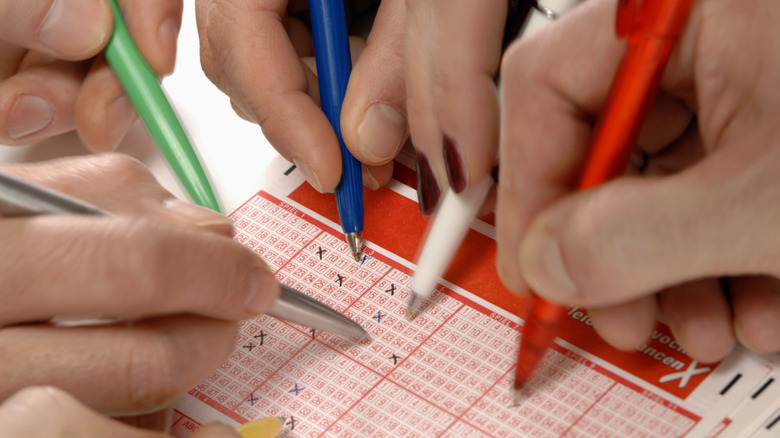The Luckiest Numbers In Lottery History
"If I only choose this magic number for the lottery, then — then! — my dreams will come true," many think. "Also, if I rotate clockwise, sprinkle some salt, sacrifice a bull, find no blemishes on its entrails, witness a providential change of course in the flight of a flock of sparrows, then — then! — untold richest shall pour upon me." Framed like that, the notion of "lucky numbers" ought to sound ridiculous. And yet, tons of articles online talk about the "luckiest lottery numbers." What gives?
Citing a (definitely non-self-interested) study on the gambling site PlayUSA, The U.S. Sun says that "online gambling experts" determined that the number 39 comes up most often across Powerball, Mega Millions, The Big Game, Hot Lotto, and Lucky for Life games. Reader's Digest opens with nearly identical wording — "up your chances of hitting it big" — and cites the number 22 as common in Mega Ball. Like The U.S. Sun, The U.S. Mirror says that 39 appears a lot in Mega Millions, as well as 9, 4, 18, and 46. Fox 8 and Khou 11, meanwhile, cite another (definitely non-self-interested) study on Just Gamblers, where 28, 16, 39, 32, and 15 are the luckiest numbers for the five games mentioned.
So is any of this true? Since the studies aren't academic, the data sets are impossible to access, and the information comes from gambling sites, well ... We'll let the reader decide. But the truth is: It doesn't matter, anyway. Lottery outcomes are random. If a number has shown up a lot, that doesn't mean it'll show up again.
Probability, not luck
Do not — we repeat: do not — go broke buying 10,000 lottery tickets full of any of the numbers mentioned above. Lottery outcomes are truly random and unpredictable. That's why no one could have predicted that certain numbers like 39 apparently show up more often than others.
Think about it like this: If you flip a coin 100 times, how many times will it turn out heads? The answer is "no clue." It could be anywhere from 0 to 100 times. Barring imperfections in minting coins, each flip has a 50/50 chance of turning up heads or tails, and that chance remains the same per flip — it doesn't change the more you flip. Contrary to common intuition, if you flip three times and get tails each time, it's not the case that you're sure to get heads next time. Now think of a lottery with balls numbered 1 through X, ordered in a chain of numbers Y long and the outcome relying on certain numbers in a certain order. That's immensely more complex than a coin toss, but the same rules apply.
So does this mean that any of the numbers on the list are "lucky?" That would depend on your definition of luck. But if you take "lucky" to mean, "If I choose these numbers then I'm more likely to win the lottery," then nope. There's no magic here. Commonly drawn numbers in the past do not present likely outcomes in the future.
The odds of choosing a winning number
Fairfield University professor Nick Kapoor talked to NBC Bay Area about lucky numbers and whether it's possible to "game the system." Much like we said earlier, he describes each lottery as an "independent event," fresh and completely randomized, where "nothing in the past or future affects each individual lottery drawing." If certain numbers have shown up before — like 28, 16, 39, 32, and 15 in the Just Gamblers study cited by Khou 11 — that's just an interesting factoid and nothing else. Tomorrow's 42 might be yesterday's 39. But still, if you're truly dedicated to wasting your money having fun playing the lottery, just do as Kappor says and choose your favorite numbers — that's it. And please: Treat it like a game.
Looking at each of the "independent events" Kapoor mentions, Powerball has over 35 billion possible winning combinations, with a 1 in 292,000,000 chance of winning the top prize each time. To put things in perspective, the Florida Museum cites a one in 4,332,817 possibility of death by shark attack during one's life. Death by a fireworks-related accident is one in 340,733. Death by bicycle accident is one in 4,919. Death by car accident is one in 84. Death by heart disease — the most common human killer — is one in five. In other words: Best hit the gym before playing scratch-offs or presenting the gods with votive offerings while begging for billions. After all, you can't spend all that money if you're dead, right?


